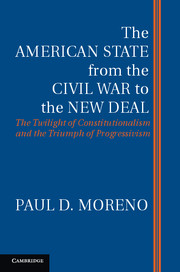 The American State from the Civil War to the New Deal
The American State from the Civil War to the New Deal Book contents
- Frontmatter
- Contents
- Abbreviations Used in the Footnotes
- Acknowledgments
- Introduction
- Part I The Old Regime
- Part II Early Progressivism
- Part III Late Progressivism
- 11 Wilsonian Progressivism
- 12 The New Freedom
- 13 The New Wilson
- 14 The Great War
- 15 The Return of the Regular Republicans
- 16 The Taft Court
- 17 The Last Progressive
- Part IV The New Deal
- Appendix A
- Appendix B
- Primary Sources
- Index
- References
13 - The New Wilson
Published online by Cambridge University Press: 05 May 2013
- Frontmatter
- Contents
- Abbreviations Used in the Footnotes
- Acknowledgments
- Introduction
- Part I The Old Regime
- Part II Early Progressivism
- Part III Late Progressivism
- 11 Wilsonian Progressivism
- 12 The New Freedom
- 13 The New Wilson
- 14 The Great War
- 15 The Return of the Regular Republicans
- 16 The Taft Court
- 17 The Last Progressive
- Part IV The New Deal
- Appendix A
- Appendix B
- Primary Sources
- Index
- References
Summary
THE BRANDEIS NOMINATION
Wilson began to rally progressive forces for the 1916 election with his dramatic nomination of Louis Brandeis to the Supreme Court in January. Wilson’s first Court appointment, James C. McReynolds, turned into one of the nemeses of the New Deal. Most accounts attribute Wilson’s choice of McReynolds to inattention, or his desire to kick a politically troublesome attorney general upstairs. But Wilson had reason to believe that McReynolds was a genuine progressive, particularly due to his antitrust record. The only progressives who disapproved of the nomination were those who called him insufficiently aggressive in railroad and oil cases. Brandeis himself endorsed McReynolds, writing that “I have the highest opinion of his ability and character and should think the country would indeed be fortunate to have him” as Attorney General. Wilson’s decision seems to have been hasty, in the midst of severe distraction due to the recent death of his wife and the outbreak of war in Europe. Ray Stannard Baker later claimed that Wilson had told him that he came to regret the choice, but no other evidence corroborates this. The infamously irascible and bigoted McReynolds became the least collegial justice in the history of the Court.
The Brandeis appointment stunned the Senate and set off a firestorm of protest. Ex-president Taft, who had long sought to serve on the Court himself, and whom Brandeis had exposed antedating a report during the Pinchot–Ballinger controversy, was especially bitter. In a private letter, Taft called the appointment “one of the deepest wounds that I have had.” He called Brandeis “a muckraker, an emotionalist for his own purposes, a Socialist. . . a man who has certain high ideals in his imagination. . . of great tenacity of purpose and, in my judgment, of much power for evil.” Taft joined several past presidents of the American Bar Association who protested the nomination. Brandeis’ supporters, fearful that an immediate vote would defeat the nomination, conducted for the first time an extensive set of hearings on a judicial appointment.
- Type
- Chapter
- Information
- The American State from the Civil War to the New DealThe Twilight of Constitutionalism and the Triumph of Progressivism, pp. 151 - 162Publisher: Cambridge University PressPrint publication year: 2013


